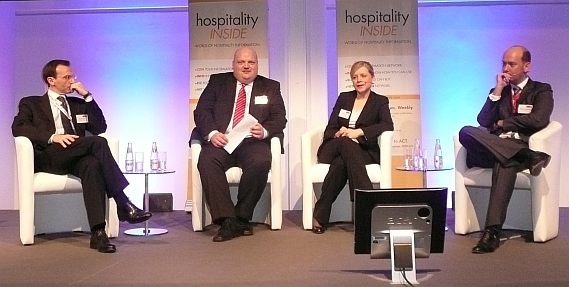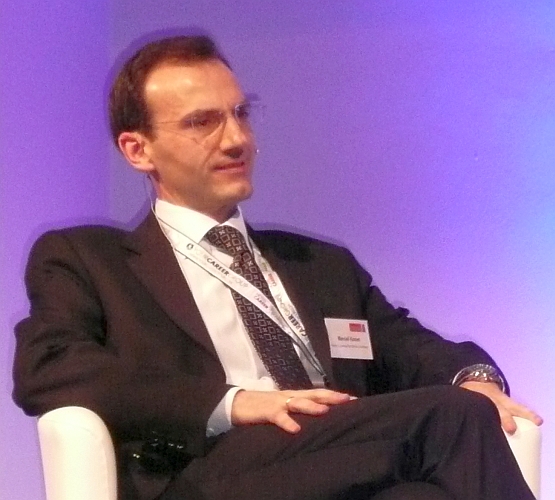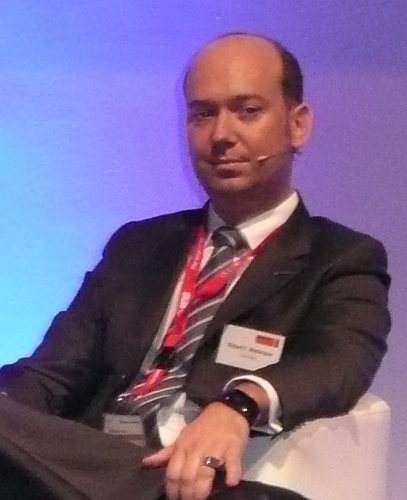7th ITB Hospitality Day: HR panel revealed gap between industry and demand
 |
|
|
Experts appealed to students, the students criticised the employers… |
Berlin (April 13, 2012). Eager, career-hungry junior hoteliers challenged the participants of the talk "The War for Talent: The Mass Exodus from the Hotel Industry" with their questions at the end. The discussion at the 7th "ITB Hospitality Day" revealed: in order to stop the universally feared mass exodus from the hotel industry, more things would have to change as are obvious right now. However, the experts recommended the junior staff the customary mixture of studies and practice, extended by economic knowledge and international experience. It still remained unclear, whether the graduates of hotel management schools and technical universities should remain exclusively loyal to the industry.
 |
|
| Manuel Konen. |
Most graduates want to become managers, said Katrin Melle, Director Human Resources at Hyatt International for Europe/Africa/Middle East in advance. "But for this purpose, professional competence and the ability to lead people in combination with expert knowledge are necessary," she summarises from an employer's point of view. Manuel Konen, Member of the Board of Konen & Lorenzen, an international recruitment company, "strongly urged" the junior staff to stay abroad for reasons of competition – "outside of Europe, in the Middle East and in Asia, preferably at an early age." He repeatedly encouraged the young people to sacrifice their holidays in order to fly to Hong Kong or Singapore for a job interview, for example.
Robert F. Wetterauer, President of Eurochrie, a European association of 1,300 universities and universities of applied sciences with courses in tourism, hotel and event management among others, advised from an academic instructor's point of view to plan in advance where they want to be in five or ten years.
 |
|
| Robert F. Wetterauer. |
However, in foreign countries, the universities/universities of applied sciences are more progressive concerning academisation and research than Germany, where knowledge in business administration has become compulsory at least. He called for academic institutions to establish a better network concerning practice and research.
Students have to know their aims
Host Hartwig Bohne, Owner of hpc bohne Consulting, cast one figure into the discussion questioningly: up to 4,000 graduates of hotel specific studies are entering the market in German-speaking countries – where are they going to find a job? Hyatt's representative answered elusively and called upon precise plans for the future for each student instead. Wetterauer advised as well to select a job according to these plans (keyword "lifelong learning"). At the same time, Melle cautions against too high expectations concerning jobs in foreign countries: in China, for example, Chinese were increasingly offering good positions to their fellow colleagues in China, so that Europeans had better chances only when they were more experienced later on.
Why is it so difficult for young academics to obtain good positions in the hotel industry? The panel’s participants see one problem in the lacking understanding of many directors who are not able to evaluate academic graduations, as they do not posses such an education themselves. "There is still a lot of work to do," says Manuel Konen regarding the lacking knowledge of responsible managers today.
 |
|
| Hartwig Bohne. |
Another problem was pointed out by Katrin Melle: in view of the repeatedly demanded practical experience for the junior staff, it is important to know that it is the "kind of practice" that counts. "Many of them are 'only' from the hotel industry,” she said. But nowadays, every job in the hotel industry requires special abilities and often more competence than expected. Today, an executive housekeeper needs economic knowledge and has to have a good feeling in the handling of staff, for example.
Katrin Melle puts jobs in chains on an equal footing with well-kept private hotels and requests medium-sized employers to recruit the junior staff for their hotels directly at universities, just like the chains.
Is migrating after the studies in the hotel industry all right?
There was no uniform evaluation concerning the question of how many students are leaving the industry after their graduation. Eurochrie President Robert Wetterauer said that a high percentage remains in the industry but would be attracted by other service-intense industries like banks and insurances by means of higher wages and better conditions.
 |
|
| Katrin Melle. |
Basically, Katrin Melle does not regard this as a flaw for the hotel industry when students migrate to other industries after a job-specific education. "We only have to be careful that the situation does not topple!", she said appealing to the audience urgently.
However, this seems to be the core question as became obvious in the concluding question and answer game between audience and panel. The students in the hall made no secret about their dissatisfaction about the industry's low salaries. A graduate from Lausanne asked in a friendly, but resolute manner how and when the industry planned to convert the "investments" of the students into a "return". From the employer's point of view, the low starting salaries are justified as the speed that salaries increase in the hotel industry is remarkable compared to other industries.
Against the reproaches of a graduate of a hotel management school in Hamburg, the industry would not be able to sell itself, Katrin Melle pointed out the foundation of the chain-comprehensive HR board "Hotel Human Resources Circle" (HHRC), which would be talking in unison for the industry. The head girl of the Hotelfachschule Berlin (hotel school Berlin) expected clearer statements of the panel participants: according to her, nearly all the students of her year were leaving the hotel industry.
|
New university guide for hotel industry Up to now, the German Hotel Association (IHA) had assembled and published the university guide on its own initiative but the third volume "Studienführer Hotellerie & Touristik – Management-Ausbildung 2012/2013" (university guide hotel industry and tourism – management education 2012/2013) was compiled in cooperation with the publisher Erich Schmidt Verlag Berlin and the University of Munich in the series "IHA-Edition Hotellerie". For the first time, the guide provides an overview about the most important hotel industry and tourism specific Bachelor and Master courses as well of university locations in Germany and Europe, and also states the costs for the studies. |
The conclusion: the students should plan their career early enough, combine studies and practice, include stays abroad/internships, and should not want to rush ahead to top positions at a young age with only little experience. In contrast to this, exclusively practice-oriented employers should deal more with the knowledge of the new generation and rethink their own, antiquated structures and hierarchical thinking.
A consultant for medium-sized entities referred to several XING contributions: there, students relate their horror experiences in hotels. If the panelists' sentences like "Not money makes you happy but the assignment!", were able to appease the career-hungry students? It did not look this way. / Maria Puetz-Willems
Continuative Links:
- Summaries and videos of all panels of ITB Hospitality Day 2012
- April 6, 2012 Preferred: Holidays in security oases: 7th "ITB Hospitality Day" on security: Dangers are becoming increasingly dynamic
- March 30, 2012 Strong brand or no brand: 7th ITB Hospitality Day on
- March 23, 2012 I love this company:
- March 16, 2012 Battle for online dominance: ITB distribution panel: Which portals will fall by the wayside?
To print this article you have to be registered and logged in for newsletter, visitor or subscription.





